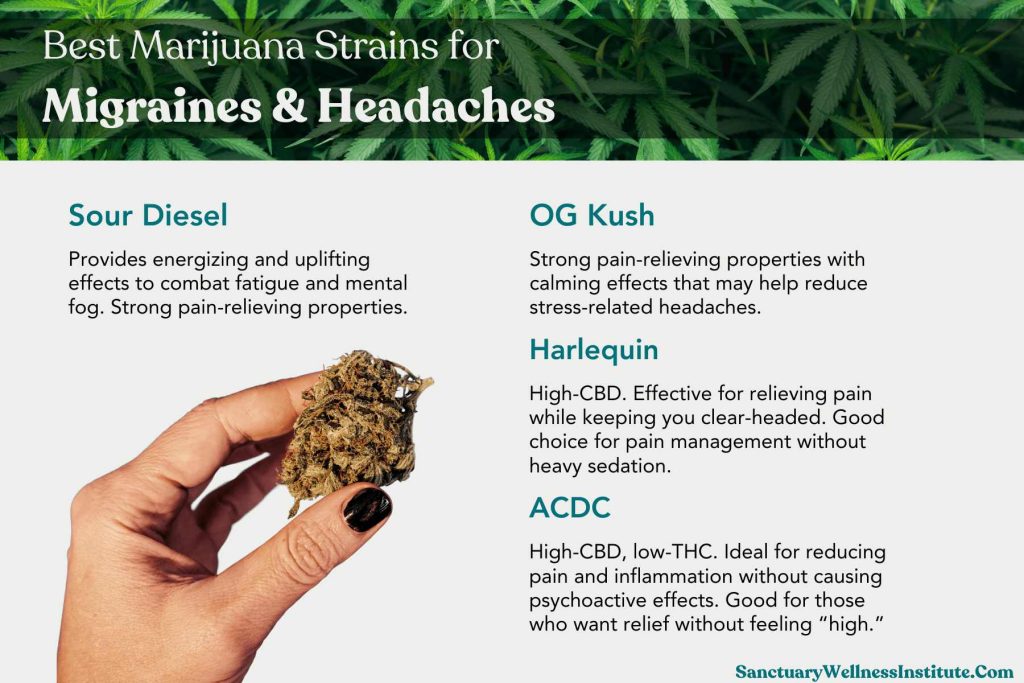Marijuana for Migraines & Headaches
- John DiBella
- Published: October 4, 2024
- Fact-checked by Dr. Desiree Granados
Migraines and intractable headaches can be debilitating conditions that significantly impact daily life. Traditional treatments often fail to provide sufficient relief, leading many people to explore alternative therapies like medical marijuana. Cannabis is known to help alleviate migraine symptoms and offer relief to those suffering from chronic and intractable headaches. In this article we’ll explain how marijuana can help with headaches and whether or not you can get a medical card.
Yes. There are many compounds in the cannabis plant that are natural antioxidants that lend themselves towards pain relief, anti inflammatory effects. This is why it is extremely important that patients are educated on cannabis as far as which strains, which products, which compounds in the plant, terpenes cannabinoid ratios are gonna be most helpful. And this is what I do during my appointments is I go over with them the things that they should be looking for as well as the compounds or strains or products to avoid as there are also compounds in this plant that are known to increase inflammation and commonly cause or worsen headaches.
Does Marijuana Help With Migraines and Headaches?
Yes, marijuana has been shown to potentially help with migraines and headaches, including intractable headaches. Cannabinoids like THC and CBD interact with the endocannabinoid system in the brain, which plays a role in regulating pain and inflammation, both of which are key factors in migraines.
Dr. Melissa Morgan, a medical marijuana doctor at The Sanctuary Wellness Institute, says that “there are many compounds in the cannabis plant that are natural anti-inflammatories and natural antioxidants that lend themselves towards pain relief and anti-inflammatory effects.”
Research suggests that cannabis might alleviate pain, reduce how long migraines last, and help manage associated symptoms like nausea and light sensitivity. Several studies have also indicated that cannabis use may lead to a reduction in the intensity and frequency of migraines.
One study published in The Journal of Pain found that migraine sufferers experienced fewer headaches when using cannabis as part of their treatment regimen. Though more research is needed to fully understand its effects, many patients report significant improvements in managing their symptoms.

What Are Migraines and Intractable Headaches?
Migraines are a type of headache disorder characterized by intense, throbbing pain, often accompanied by nausea, vomiting, and sensitivity to light and sound. Migraines can last anywhere from a few hours to several days and can be so severe that they hinder the ability to perform everyday activities. Triggers for migraines can include stress, hormonal changes, certain foods, and environmental factors.
Intractable headaches, also known as refractory headaches, are a chronic form of headache that does not respond well to traditional treatments. These headaches persist despite the use of over-the-counter medications, prescription drugs, or other medical interventions. Individuals suffering from intractable headaches often find themselves exploring alternative therapies like medical marijuana to manage their condition.
Traditional treatments for migraines include pain relievers, triptans, and preventative medications like beta-blockers or antidepressants. While these treatments work for some, they often come with side effects or limited effectiveness.
Can You Get a Medical Marijuana Card for Migraines?
Yes, you can get a medical marijuana card for migraines or intractable headaches in several states. The following states list “Migraines” as a qualifying condition for a medical marijuana card:
Additionally, Connecticut lists “intractable headaches” as a qualifying condition. If migraines or intractable headaches are not listed as qualifying conditions in your state, you may still be eligible for a medical marijuana card. For example, in Florida, New York, Virginia, Washington D.C., and many other states, doctors may prescribe medical marijuana at their discretion for any condition they consider suitable for cannabis treatment.
Additionally, many states recognize symptoms commonly linked to migraines and headaches as qualifying conditions for medical marijuana, including:
If you experience migraines or intractable headaches and your state allows medical marijuana for these conditions, you can easily obtain a medical marijuana card through The Sanctuary Wellness Institute. This simple process involves consulting with a medical marijuana doctor who will assess whether cannabis is the right option for you.
How to Use Marijuana for Migraines and Intractable Headaches
There are several ways to use marijuana to help manage migraines and intractable headaches, and the best method depends on personal preference and symptom severity.
- Vaping or smoking: These methods provide fast-acting relief, which can be particularly helpful during the onset of a migraine attack. Inhalation allows cannabinoids to enter the bloodstream quickly, making it effective for immediate symptom relief.
- Edibles: For those who prefer not to smoke or vape, edibles are a convenient and discreet option. However, they take longer to take effect, so they might be better suited for prevention or managing chronic symptoms.
- Oils and tinctures: These can be taken sublingually (under the tongue) for faster absorption or added to food and drinks for a more gradual effect. They offer precise dosing, which is helpful for managing varying levels of headache pain.
- Topicals: Some people find relief by applying cannabis-infused creams or balms directly to the temples or forehead, although this method is typically more effective for localized pain relief.
It’s important to consult with a medical marijuana doctor to determine the right method and dosage for your needs.

What Are the Best Marijuana Strains for Migraines?
Certain marijuana strains may be particularly effective in managing migraines and intractable headaches. The effects of cannabis strains can vary based on their THC and CBD content, so choosing the right strain for symptom relief is key.
Dr. Morgan highlights the importance of being educated on cannabis and choosing the best weed strains. “It is extremely important that patients are educated on cannabis,” she says, “particularly regarding which strains, products, compounds in the plant, terpenes, and cannabinoid ratios are going to be most helpful.”
Here are a few strains that may help with headaches:
- ACDC: This high-CBD, low-THC strain is ideal for reducing pain and inflammation without causing psychoactive effects. It’s a great option for those who want relief without feeling “high.”
- OG Kush: Known for its strong pain-relieving properties, OG Kush can help ease the severity of migraines and intractable headaches. It also has calming effects that may help reduce stress-related headaches.
Harlequin: Another high-CBD strain, Harlequin is effective for relieving pain while keeping you clear-headed. It’s a good choice for people looking to manage chronic migraines without heavy sedation. - Sour Diesel: This strain provides energizing and uplifting effects, which can help combat the fatigue and mental fog that often accompany migraines. Sour Diesel also has strong pain-relieving properties.
Consulting with a cannabis expert or medical marijuana doctor can help you choose the best strain for your specific symptoms.
What Are the Potential Risks and Side Effects of Using Cannabis for Migraines?
Dr. Morgan explains that not all types of cannabis are suitable for patients who suffer from migraines. “I explain to my patients which compounds, strength, and products they should use and which to avoid,” she says. “Some compounds in cannabis are known to increase inflammation, often causing or worsening the headache. I help ensure patients avoid that.”
While medical marijuana might help alleviate migraine symptoms, it’s essential to be aware of potential side effects. Common side effects of cannabis use include dry mouth, dizziness, and changes in appetite. For those prone to anxiety, higher doses of THC may occasionally trigger feelings of paranoia or heightened anxiety.
However, adverse effects are typically mild and can be managed by starting with a low dose and gradually increasing it under the guidance of a medical marijuana doctor. It’s important to monitor how your body reacts to cannabis, especially when using it for the first time.
Conclusion
Medical marijuana offers a potential option for those suffering from migraines and intractable headaches, providing relief from pain and associated symptoms where traditional treatments may fall short. The Sanctuary Wellness Institute can help you navigate the process of obtaining a medical marijuana card and offer guidance on how to incorporate cannabis into your treatment plan.
States Where We Offer Medical Marijuana Card Services
How we reviewed this article:
- Mingma L Sherpa, Nilasma Shrestha, Blessing T Ojinna, Niriksha Ravi, Vivig Shantha Kumar, Silpa Choday, Anusha Parisapogu, Hadrian Hoang-Vu Tran, Anil KC, and Abeer O Elshaikh (2022). Efficacy and Safety of Medical Marijuana in Migraine Headache: A Systematic Review
https://www.ncbi.nlm.nih.gov/pmc/articles/PMC9845509/ - Carrie Cuttler, Alexander Spradlin, Michael J. Cleveland and Rebecca M. Craft (2020). Short- and Long-Term Effects of Cannabis on Headache and Migraine
https://www.jpain.org/article/S1526-5900(19)30848-X/fulltext - Mayo Clinic (2023). Migraine
https://www.mayoclinic.org/diseases-conditions/migraine-headache/symptoms-causes/syc-20360201 - American Migraine Foundation (2016). Intractable Headache
https://americanmigrainefoundation.org/resource-library/intractable-headache/ - Leafly (2024). Harlequin
https://www.leafly.com/strains/harlequin - Leafly (2024). Sour Diesel
https://www.leafly.com/strains/sour-diesel - Calm (2023). Does THC cause anxiety? Effects of THC vs CBD on mental health
https://www.calm.com/blog/thc-and-anxiety
Current Version
October 4, 2024
Written By
John DiBella
Fact-checked By
Dr. Melissa Morgan
Editorial Process
Our Editorial Process

John DiBella is the co-founder and CEO at The Sanctuary Wellness Institute. His goal is to foster healthier lifestyles to improve individuals’ quality of life and health span through online medical and non-medical services. When he’s not writing health & wellness articles for The Sanctuary, he enjoys hiking, camping, surfing and sailing.







